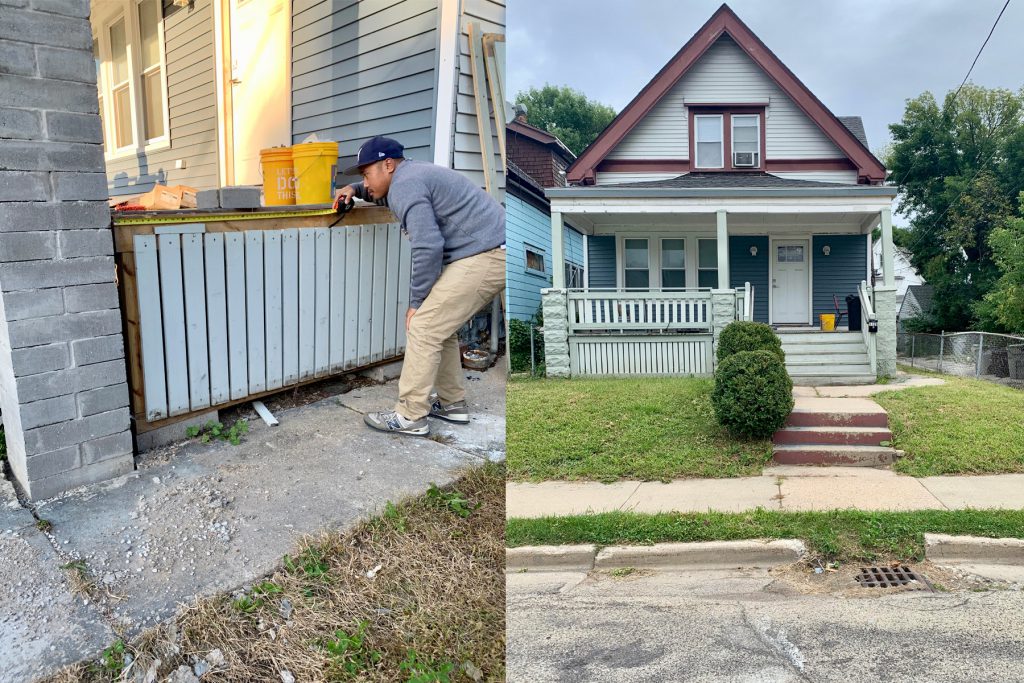How to Become a Homeowner
Tired of renting? Here are tips, experts to help you make transition.

Madee Saenphonphakdee says buying a foreclosed home worked for him because he had the skills necessary to fix it. Photo courtesy of Madee Saenphonphakdee.
Phoebe Alexander, 51, rented houses in Milwaukee for 24 years. During that time, she had two landlords. They were good, she said, but like most tenants, Alexander wasn’t allowed to change things to her liking.
The desire to become a homeowner was something Alexander had wanted for a long time, but first she had some financial issues to work out. So five years ago, Alexander began taking classes and in June 2019, she became the homeowner and landlord of the duplex she had been living in for the past 16 years.
Alexander’s acquisition of her home was unique – her landlord had lost the house to the city – but the situation is a common one. People want to be homeowners.
While becoming a homeowner may seem daunting, there are organizations to help guide you.
The advantages of being a homeowner
Cinthia Hernandez, the housing outreach manager for Layton Boulevard West Neighbors, said there are many benefits to buying a home. Aside from being able to make cosmetic changes, owning a home can be more affordable in the long run.
People want a place that is stable, a place for their kids, and, most important, a place they can own, Hernandez said.
Hernandez said potential buyers often are shown several homes, which range from move-in ready to fixer-uppers. Whichever type of house a person chooses, Hernandez tells everyone the same thing.
Madee Saenphonphakdee, 31, has been a homeowner for the past four years, but he had been a renter since his college days.
“I [realized] I could buy a house and pay the exact same amount [as renting], except I would own it,” he said.
Saenphonphakdee, with help from Acts Housing, an agency that helps families buy housing, decided to purchase a foreclosed home, under the presumption that he’d bring it up to code. In addition to gutting the house and ensuring that the plumbing and electrical worked, Saenphonphakdee wanted a house that was livable and looked nice.
For six months, using the skills he picked up when he worked in construction, Saenphonphakdee worked on his house, fixing the amenities. Once the house was deemed livable, he moved in and has been renovating the place ever since.
“It’s not as intimidating as people think,” he said.
Advice from housing experts
Real estate agent Deon Price has worked at Acts Housing for the past two years. Becoming a homeowner is one of the keys to financial independence, he said.
When it comes to buying a house, some of the necessary steps are really simple, Price said. Having a job and lines of credit are a good start. He also advises that people know what type of house they want and the neighborhood.
“I do occasionally recommend housing, but I don’t recommend neighborhoods,” Price said.
Clients must determine if the neighborhood they’re looking in suits them. Price said he tells people to explore the neighborhood around the houses they want.
“Morning, noon and night, drive through those neighborhoods,” Price said.
Clients can then get a good sense of the area and the activity. They also learn where, for example, the grocery store, churches and schools are located.
Price does his best to find housing options for people in whichever neighborhood they choose. However, he noted, renting options are usually more affordable in some areas. That is to say, an individual may like a certain neighborhood, but they may not be able to afford a house there.
“You can stay wherever you want to stay as long as you can afford it,” Price said.
Shelina Harvey, a financial coach for Wisconsin Women’s Business Initiative Corp., said she has her clients track their spending. This helps them cut back on unnecessary purchases and work toward their savings goal.
Harvey said about 40 percent of her clients have wanted to buy a home. In some cases, a client may need to repair his or her credit or take classes to apply for a housing grant.
“If you want to buy a house, you got to put in the work,” Harvey said.
Tess Wynn, a real estate agent with Acts Housing, said buyers should always be prepared for extra expenses, including the appraisal, inspection, real estate fees and so on. Having a responsive agent is key, because a house that is priced right could be sold in three days, she said.
Wynn added that getting the financial documents in order helps ensure the process moves forward smoothly.
“The process of finding a home can be emotional,” Wynn said, but it’s also fun and rewarding.
Additional resources
Wisconsin Women’s Business Initiative Corporation (WWBIC)
WWBIC offers classes that help people become financially savvy.
Address: 1533 N. Rivercenter Drive
Phone: (414) 263-5450
Acts Housing
Through Acts Housing, clients can meet with a financial counselor to help them become home buyer ready.
Address: 2414 W. Vliet St.
Phone: (608) 305-4183
Email: acts@housing.org
The Housing Authority has rental assistance, a housing voucher program and more.
Address: 809 N. Broadway Ave.
Phone: (414) 286-5824
Layton Boulevard West Neighbors
Layton Boulevard West Neighbors connects people with the resources they need to buy a home.
Address: 1545 S. Layton Blvd.
Phone: (414) 383-9038
Housing Resources
Housing Resources helps families and communities with loan programs, counselling and more.
Address: Headquarters, 7830 W. Burleigh St.
Phone: (414) 461-6330
Address 2: South Milwaukee, 1615 S. 22nd St.
Phone 2: (414) 383-8831
Address 3: North Milwaukee, 2500 W. Capitol Drive
Phone 3: (414) 449-0705
This story was originally published by Milwaukee Neighborhood News Service, where you can find other stories reporting on fifteen city neighborhoods in Milwaukee.





















